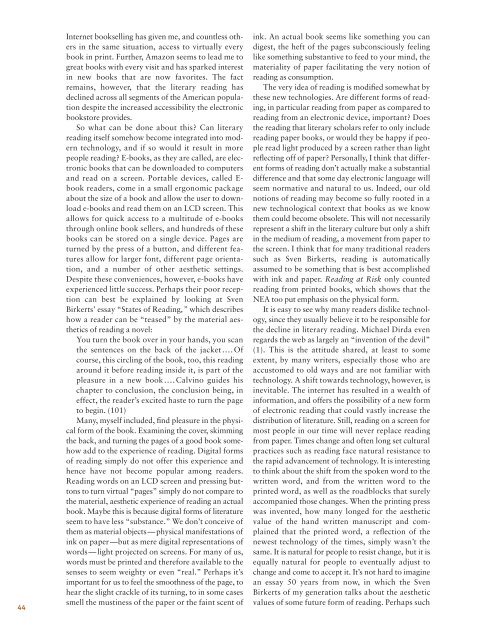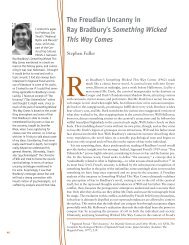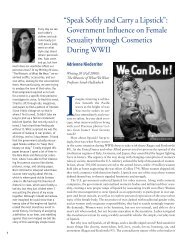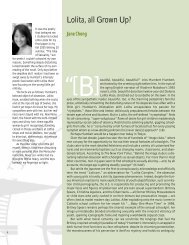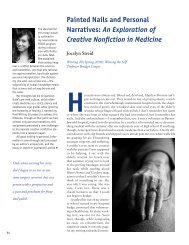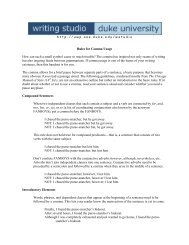America's Decline in Literary Reading: Grappling with Technology's ...
America's Decline in Literary Reading: Grappling with Technology's ...
America's Decline in Literary Reading: Grappling with Technology's ...
You also want an ePaper? Increase the reach of your titles
YUMPU automatically turns print PDFs into web optimized ePapers that Google loves.
44<br />
Internet booksell<strong>in</strong>g has given me, and countless others<br />
<strong>in</strong> the same situation, access to virtually every<br />
book <strong>in</strong> pr<strong>in</strong>t. Further, Amazon seems to lead me to<br />
great books <strong>with</strong> every visit and has sparked <strong>in</strong>terest<br />
<strong>in</strong> new books that are now favorites. The fact<br />
rema<strong>in</strong>s, however, that the literary read<strong>in</strong>g has<br />
decl<strong>in</strong>ed across all segments of the American population<br />
despite the <strong>in</strong>creased accessibility the electronic<br />
bookstore provides.<br />
So what can be done about this? Can literary<br />
read<strong>in</strong>g itself somehow become <strong>in</strong>tegrated <strong>in</strong>to modern<br />
technology, and if so would it result <strong>in</strong> more<br />
people read<strong>in</strong>g? E-books, as they are called, are electronic<br />
books that can be downloaded to computers<br />
and read on a screen. Portable devices, called Ebook<br />
readers, come <strong>in</strong> a small ergonomic package<br />
about the size of a book and allow the user to download<br />
e-books and read them on an LCD screen. This<br />
allows for quick access to a multitude of e-books<br />
through onl<strong>in</strong>e book sellers, and hundreds of these<br />
books can be stored on a s<strong>in</strong>gle device. Pages are<br />
turned by the press of a button, and different features<br />
allow for larger font, different page orientation,<br />
and a number of other aesthetic sett<strong>in</strong>gs.<br />
Despite these conveniences, however, e-books have<br />
experienced little success. Perhaps their poor reception<br />
can best be expla<strong>in</strong>ed by look<strong>in</strong>g at Sven<br />
Birkerts’ essay “States of Read<strong>in</strong>g,” which describes<br />
how a reader can be “teased” by the material aesthetics<br />
of read<strong>in</strong>g a novel:<br />
You turn the book over <strong>in</strong> your hands, you scan<br />
the sentences on the back of the jacket....Of<br />
course, this circl<strong>in</strong>g of the book, too, this read<strong>in</strong>g<br />
around it before read<strong>in</strong>g <strong>in</strong>side it, is part of the<br />
pleasure <strong>in</strong> a new book....Calv<strong>in</strong>o guides his<br />
chapter to conclusion, the conclusion be<strong>in</strong>g, <strong>in</strong><br />
effect, the reader’s excited haste to turn the page<br />
to beg<strong>in</strong>. (101)<br />
Many, myself <strong>in</strong>cluded, f<strong>in</strong>d pleasure <strong>in</strong> the physical<br />
form of the book. Exam<strong>in</strong><strong>in</strong>g the cover, skimm<strong>in</strong>g<br />
the back, and turn<strong>in</strong>g the pages of a good book somehow<br />
add to the experience of read<strong>in</strong>g. Digital forms<br />
of read<strong>in</strong>g simply do not offer this experience and<br />
hence have not become popular among readers.<br />
Read<strong>in</strong>g words on an LCD screen and press<strong>in</strong>g buttons<br />
to turn virtual “pages” simply do not compare to<br />
the material, aesthetic experience of read<strong>in</strong>g an actual<br />
book. Maybe this is because digital forms of literature<br />
seem to have less “substance.” We don’t conceive of<br />
them as material objects—physical manifestations of<br />
<strong>in</strong>k on paper—but as mere digital representations of<br />
words—light projected on screens. For many of us,<br />
words must be pr<strong>in</strong>ted and therefore available to the<br />
senses to seem weighty or even “real.” Perhaps it’s<br />
important for us to feel the smoothness of the page, to<br />
hear the slight crackle of its turn<strong>in</strong>g, to <strong>in</strong> some cases<br />
smell the must<strong>in</strong>ess of the paper or the fa<strong>in</strong>t scent of<br />
<strong>in</strong>k. An actual book seems like someth<strong>in</strong>g you can<br />
digest, the heft of the pages subconsciously feel<strong>in</strong>g<br />
like someth<strong>in</strong>g substantive to feed to your m<strong>in</strong>d, the<br />
materiality of paper facilitat<strong>in</strong>g the very notion of<br />
read<strong>in</strong>g as consumption.<br />
The very idea of read<strong>in</strong>g is modified somewhat by<br />
these new technologies. Are different forms of read<strong>in</strong>g,<br />
<strong>in</strong> particular read<strong>in</strong>g from paper as compared to<br />
read<strong>in</strong>g from an electronic device, important? Does<br />
the read<strong>in</strong>g that literary scholars refer to only <strong>in</strong>clude<br />
read<strong>in</strong>g paper books, or would they be happy if people<br />
read light produced by a screen rather than light<br />
reflect<strong>in</strong>g off of paper? Personally, I th<strong>in</strong>k that different<br />
forms of read<strong>in</strong>g don’t actually make a substantial<br />
difference and that some day electronic language will<br />
seem normative and natural to us. Indeed, our old<br />
notions of read<strong>in</strong>g may become so fully rooted <strong>in</strong> a<br />
new technological context that books as we know<br />
them could become obsolete. This will not necessarily<br />
represent a shift <strong>in</strong> the literary culture but only a shift<br />
<strong>in</strong> the medium of read<strong>in</strong>g, a movement from paper to<br />
the screen. I th<strong>in</strong>k that for many traditional readers<br />
such as Sven Birkerts, read<strong>in</strong>g is automatically<br />
assumed to be someth<strong>in</strong>g that is best accomplished<br />
<strong>with</strong> <strong>in</strong>k and paper. Read<strong>in</strong>g at Risk only counted<br />
read<strong>in</strong>g from pr<strong>in</strong>ted books, which shows that the<br />
NEA too put emphasis on the physical form.<br />
It is easy to see why many readers dislike technology,<br />
s<strong>in</strong>ce they usually believe it to be responsible for<br />
the decl<strong>in</strong>e <strong>in</strong> literary read<strong>in</strong>g. Michael Dirda even<br />
regards the web as largely an “<strong>in</strong>vention of the devil”<br />
(1). This is the attitude shared, at least to some<br />
extent, by many writers, especially those who are<br />
accustomed to old ways and are not familiar <strong>with</strong><br />
technology. A shift towards technology, however, is<br />
<strong>in</strong>evitable. The <strong>in</strong>ternet has resulted <strong>in</strong> a wealth of<br />
<strong>in</strong>formation, and offers the possibility of a new form<br />
of electronic read<strong>in</strong>g that could vastly <strong>in</strong>crease the<br />
distribution of literature. Still, read<strong>in</strong>g on a screen for<br />
most people <strong>in</strong> our time will never replace read<strong>in</strong>g<br />
from paper. Times change and often long set cultural<br />
practices such as read<strong>in</strong>g face natural resistance to<br />
the rapid advancement of technology. It is <strong>in</strong>terest<strong>in</strong>g<br />
to th<strong>in</strong>k about the shift from the spoken word to the<br />
written word, and from the written word to the<br />
pr<strong>in</strong>ted word, as well as the roadblocks that surely<br />
accompanied those changes. When the pr<strong>in</strong>t<strong>in</strong>g press<br />
was <strong>in</strong>vented, how many longed for the aesthetic<br />
value of the hand written manuscript and compla<strong>in</strong>ed<br />
that the pr<strong>in</strong>ted word, a reflection of the<br />
newest technology of the times, simply wasn’t the<br />
same. It is natural for people to resist change, but it is<br />
equally natural for people to eventually adjust to<br />
change and come to accept it. It’s not hard to imag<strong>in</strong>e<br />
an essay 50 years from now, <strong>in</strong> which the Sven<br />
Birkerts of my generation talks about the aesthetic<br />
values of some future form of read<strong>in</strong>g. Perhaps such


